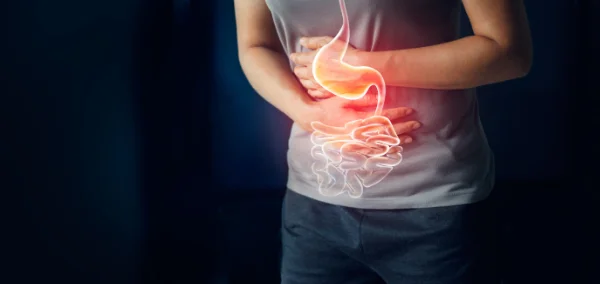From Diet to Digestion: Foods That Promote Colorectal and Gut Health
Your diet plays an important role in maintaining not just overall health but also the health of your digestive system. A well-balanced diet can support colorectal health and reduce the risk of constipation, diverticulitis, and even colorectal cancer. Combining a fibre-rich diet with a nutrient-dense diet is essential for healthy digestion and long-term gut health.

This blog explores the connection between diet and digestion, highlights the top foods for health, and offers practical tips to make healthy eating an effortless part of your daily routine.
Diet and Digestion
Your digestive system thrives on the nutrients you provide. A diet rich in high-fibre foods, vitamins, and minerals supports regular bowel movements, and promotes a healthy gut microbiome.
In contrast, poor dietary habits—such as consuming processed foods low in fibre—can lead to issues like bloating, constipation, and increased risks of colorectal disorders. Chronic low-fibre diets are also linked to serious conditions like diverticulitis and colorectal cancer.
In addition to diet, hydration is essential. Drinking adequate water helps prevent constipation by keeping stool soft and supporting the entire digestive process. A proper balance of nutrients and hydration can make a significant difference in your colorectal health.
Top Foods for Gut Health
Adding specific foods to your meals can significantly benefit your colorectal health and help in preventing colorectal issues. Here’s a closer look at what you should prioritise:
High-Fibre Foods
Fibre supports healthy digestion by bulking up stool and promoting regular bowel movements. Include these fibre-rich options:
- Whole Grains: Oats, quinoa, barley, and brown rice are excellent choices for adding fibre to your meals.
- Legumes: Lentils, chickpeas, and black beans are packed with fibre, protein, and essential nutrients.
- Fruits: Apples, pears, and berries not only offer natural sweetness, but are also rich in soluble fibre.
- Vegetables: Leafy greens like spinach, cruciferous vegetables like broccoli, and root vegetables like carrots are fibre powerhouses.
Probiotic Foods
Probiotics, found in fermented foods, help maintain a healthy gut microbiome. Beneficial bacteria improve digestion and strengthen colorectal health. Incorporate these probiotic foods:
- Yogurt and Kefir: Look for options with live cultures for maximum benefits.
- Fermented Foods: Sauerkraut, kimchi, and miso contribute to good gut health.
Healthy Fats
Fats from natural sources support the absorption of fat-soluble vitamins that are important for digestive health. opt for:
- Nuts and Seeds: Almonds, chia seeds, and flaxseeds offer fibre and healthy omega-3 fatty acids.
- Avocados: They promote digestion and are rich in healthy monounsaturated fats and fibre.
- Olive Oil: A great source of healthy fats, perfect for salad dressing or drizzled over cooked veggies.
Hydration
Water is an often-overlooked aspect of digestive health. Staying hydrated helps prevent constipation by ensuring stool remains soft. For additional flavour, try infusing water with citrus slices or herbs.
Avoid Processed Foods
Foods high in added sugars, red meats, and processed ingredients can harm your digestive health. Excessive consumption of these can lead to less inflammation, reduced gut bacteria diversity, and increased colorectal cancer risks.
Building Healthy Eating Habits
Incorporating foods that promote colorectal health into your daily routine doesn’t have to feel overwhelming or restrictive. By making gradual changes and being mindful of your meal choices, you can establish habits that significantly benefit your digestive health.
Add Veggies to Your Meals
Vegetables are high-nutrient foods packed with fibre, vitamins, and minerals essential for colorectal health. Adding them to every meal can be as simple as:
- Including a side of roasted vegetables like broccoli, carrots, or zucchini at dinner.
- Tossing fresh spinach or rocket into your morning omelette or smoothie.
- Preparing a hearty salad as the main dish or as a side with lunch.
- Mixing grated vegetables, such as carrots or zucchini, into cakes, casseroles, or even baked goods.
Choose Whole Grains
Refined grains can often lack the nutrients your body needs, but whole grains are rich in fibre and other vital nutrients that improve digestive health. Switching to whole grains is simple and can include:
- Swapping white bread or pasta for whole-grain versions like whole wheat bread or whole-grain spaghetti.
- Cooking quinoa, farro, or bulgar instead of white rice for a nutrient-dense side dish.
- Trying oats, bran flakes, or muesli for breakfast instead of sugary cereals.
- Experimenting with whole-grain snacks like brown rice cakes or whole-grain crackers.
Snack Smarter
Mindless snacking on chips, chocolates, lollies, or processed foods can add unnecessary sugar and fat while contributing little nutritional value. Choose healthier snack options that nourish your body, such as:
- A handful of almonds, walnuts, or seeds like sunflower or pumpkin seeds.
- Slices of fresh fruit like apples, pears, or berries paired with nut butter or plain yogurt.
- Veggie sticks (carrots, cucumber, or celery) with hummus.
- Probiotic-rich snacks like plain yogurt or kefir topped with granola.
Meal Plan
Life can get busy, making it harder to stick to healthy eating habits. Meal prepping ensures you always have nutritious options on hand. Dedicate a specific day to prepare large portions of nutrient-dense foods which can be stored in the fridge or freezer for later. Stock your pantry and fridge with staples like canned beans, whole grains, fresh produce, and fermented foods. Plan a weekly menu to reduce decision fatigue and eliminate the temptation to choose unhealthy takeout options.
A balanced diet of high-fibre foods combined with a nutrient-dense diet, probiotics, and other gut-friendly foods is key to maintaining optimal colorectal health. Reducing your intake of processed foods and staying hydrated also contribute to a healthy digestive system.
Small changes to your diet today can lead to big health benefits tomorrow. Start incorporating these foods into your meals and take a proactive step towards better gut health.
